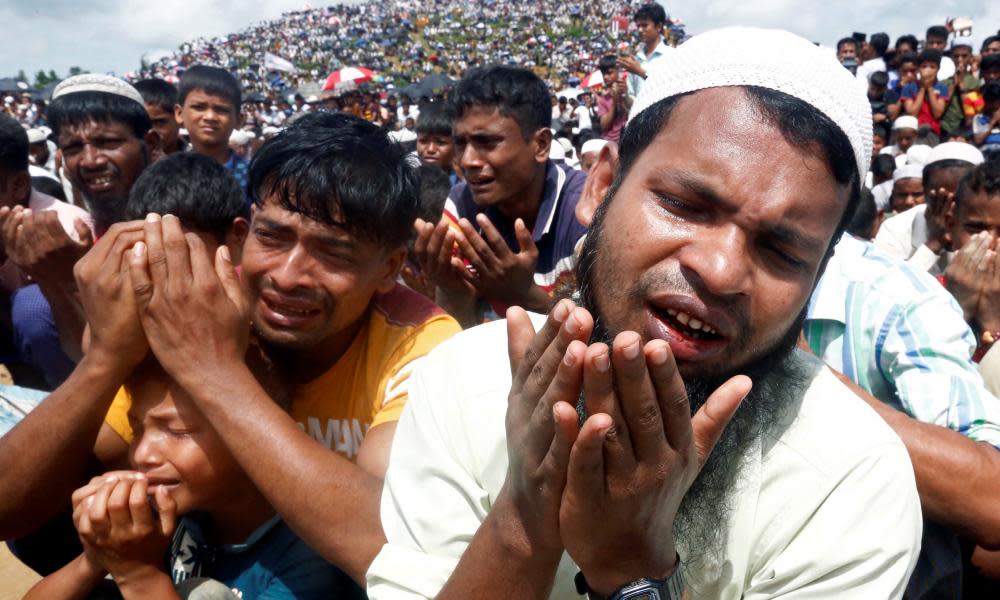UN's top court orders Myanmar to protect Rohingya from genocide

Myanmar has been ordered by the United Nations’ highest court to prevent genocidal violence against its Rohingya Muslim minority and preserve evidence of past attacks.
In a momentous and unanimous decision, the international court of justice (ICJ) in The Hague ordered Myanmar to carry out emergency, “provisional” measures, intervening in the country’s domestic affairs by instructing the government of Aung San Suu Kyi to respect the requirements of the 1948 genocide convention.
Declaring there was prima facie evidence of breaches of the convention, the court found the estimated 600,000 Rohingya remaining in Myanmar were “extremely vulnerable” to violence at the hands of the military.
The ruling amounts to a rejection of Aung San Suu Kyi’s defence of her country against accusations of systematic human rights abuses and war crimes during a three-day hearing at the ICJ last month.
The case was brought by the Gambia, a predominantly Muslim west African state that alleges Myanmar has breached the genocide convention, which was enacted after the Holocaust.
Thursday’s ruling dealt only with Gambia’s request for so-called preliminary measures, the equivalent of a restraining order for states. It gave no indication of the court’s final decision, which could take years to reach.
In a unanimous ruling by a panel of 17 judges, the court said Myanmar must take all steps within its power to prevent serious harm to Rohingya, and report back within four months.
Gambia’s attorney general and justice minister, Abubacarr Marie Tambadou, told the court in December: “Another genocide is unfolding right before our eyes yet we do nothing to stop it. This is a stain on our collective conscience. It’s not only the state of Myanmar that is on trial here, it’s our collective humanity that is being put on trial.”
Described as the world’s most persecuted people, 1.1 million Rohingya people live in Myanmar. They live predominately in Rakhine state, where they have co-existed uneasily alongside Buddhists for decades.
Rohingya people say they are descendants of Muslims, perhaps Persian and Arab traders, who came to Myanmar generations ago. Unlike the Buddhist community, they speak a language similar to the Bengali dialect of Chittagong in Bangladesh.
The Rohingya are reviled by many in Myanmar as illegal immigrants and suffer from systematic discrimination. The Myanmar government treats them as stateless people, denying them citizenship. Stringent restrictions have been placed on Rohingya people’s freedom of movement, access to medical assistance, education and other basic services.
Violence broke out in northern Rakhine state in August 2017, when militants attacked government forces. In response, security forces supported by Buddhist militia launched a “clearance operation” that ultimately killed at least 1,000 people and forced more than 600,000 to flee their homes. The UN’s top human rights official said the military’s response was "clearly disproportionate” to insurgent attacks and warned that Myanmar’s treatment of its Rohingya minority appears to be a "textbook example” of ethnic cleansing.
When Aung San Suu Kyi rose to power there were high hopes that the Nobel peace prize winner would help heal Myanmar's entrenched ethnic divides. But she has been accused of standing by while violence is committed against the Rohingya.
In 2019, judges at the international criminal court authorised a full-scale investigation into the allegations of mass persecution and crimes against humanity. On 10 December 2019, the international court of justice in The Hague opened a case alleging genocide brought by the Gambia.
The complaint is one of the first attempts to use the international justice system to help the estimated 730,000 Rohingya refugees who fled Myanmar after army clearance operations in Rakhine state during 2017.
Related: Massacre at Tula Toli: Rohingya recall horror of Myanmar army attack
Lawyers for the Gambia had called on the ICJ to impose protective provisional measures to prevent further killings and destruction in Myanmar. The case was heard by a panel of 17 international judges, including one each nominated by Myanmar and the Gambia.
Six of Myanmar’s most senior army officers have been accused of genocide by a UN fact-finding mission and recommended for criminal prosecution.
Aung San Suu Kyi’s decision to attend the court in person astounded human rights groups. Once an international icon representing peaceful defiance of military dictatorship, the 74-year-old has seen her reputation plummet as she repeatedly defended her country’s army in the aftermath of the Rohingya exodus.
She urged ICJ judges to dismiss allegations that Myanmar committed genocide and instead allow the country’s court martial system to deal with any human rights abuses.
A Myanmar government-appointed panel, the Independent Commission of Enquiry, said on Monday it had found no evidence of genocide. Rohingya leaders have branded the report a “whitewash”.
The ICJ only hears cases brought by one state against another. It has jurisdiction to hear complaints of breaches of the genocide convention even if the aggrieved state is not directly affected by violence or refugees.
The court can use its legal powers to impose provisional measures on member states in relation to their obligations under the convention.


